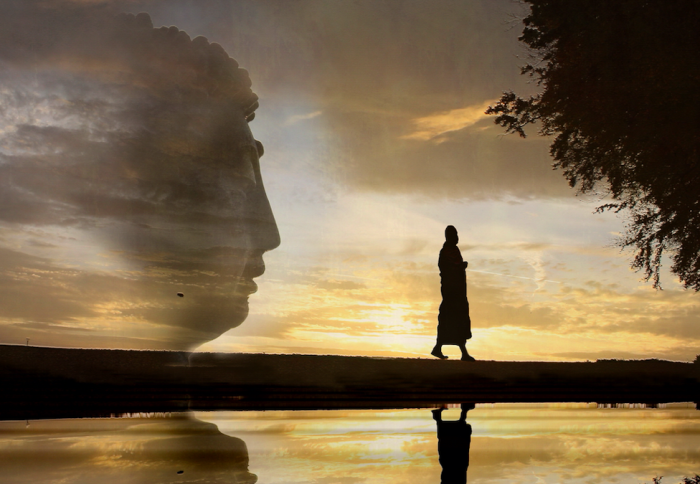In referring to the mystical experience, and what to do after having one, Alan Watts famously said, “When you get the message, hang up.”
This is certainly one of the wisest things to have slipped out the poetic mouth of Watts, because of its sharp and direct truthfulness. It is slightly disconcerting for me to admit that this entire article is dedicated to these seven words, but Watts was so brilliant at writing, and so stylish in his way of saying things, that I am not ashamed to admit it.
Watts said this for one main reason: after having a mystical experience—whether through the assistance of plant medicines or meditation or whatever—it is a mistake to chase more experiences in hopes that they will liberate you (Ram Dass made this mistake early on, and talks about it in many of his books).
Begging for more messages will not necessarily help you to understand the messenger. In fact, depending on your disposition, more messages might boost your sense of self, resulting in what Chögyam Trungpa called, “Spiritual Materialism.”
In today’s world, where psychedelics and meditation are slowly but surely becoming mainstream, Watts’ advice is both exquisite and sound, for these methods and medicines (yes, I did just use that word) are able to produce the sort of spiritual experiences I am talking about, and thus expose the spiritual aspirant to the silly game of getting high on experiences—which is just another craving of the ego.
It takes a certain level of maturity to follow through with a spiritual experience using sober methods. It takes even more maturity to understand that enlightenment itself is not an experience. It is a way of being in the here and now and accepting the moment for all it is, regardless of what labels your mind has put on it. It is, as a Zen master once said, intimacy with the 10 000 things.
A spiritual experience, much like a word, should be honored as a pointer toward the moon—not as the moon itself. In addition to this, a spiritual experience ends, like all things constrained in space and time. Adyashanti said it so well: “There is no such thing as the endlessly perpetuating spiritual experience.”
That is not to say they are bad or don’t play a role in showing you the nature of reality. They can, and sometimes do, catapult an individual into the essence of what’s really going on. They can also affect an individual on such a positive level that they are changed forever. If you have taken ayahuasca, for instance, or sat in the dark for 10 days, the chances of you having touched something profoundly beautiful and terrifying are high.
(Isn’t beauty, as Rilke said, just the beginning of terror anyways?)
You may have wept a thousand tears and rubbed shoulders with Ganesh, danced lifetimes with Shiva, or dissolved into cosmic consciousness, but if you are unable to integrate the experience into your everyday, ordinary life, it is worth nothing. And if you are unable to see through the small self to which the experience has occurred, it is worth nothing.
All the spiritual experiences in the world do not matter if you are not paying attention to the one who is experiencing them. That’s really what this game is all about, after all: understanding who you really are. And who you really are is spacious, transparent, open, and colorless, lacking in all qualities but love and acceptance.
Who you really are is not an experience. It is the space in which all experiences occur. That’s why, when you are able to accept every experience for what it is, you feel free.
To say something about the integration process after being blown out of the water: it is nowhere near as romantic as some people make it out to be. In fact, it is nothing people make it out to be because life is not built to meet your expectations; it is built to destroy them.
For me, the process continues to be plain and ordinary, like chopping wood and carrying water. In Zen, they have a magnificent saying: “Before enlightenment, chop wood and carry water. After enlightenment, chop wood and carry water.” The beginning stages of spiritual awakening may certainly be dreamy and romantic, but the integration process is subtle, grounded, and deceptively simple. This does not mean we should not celebrate. Celebrate, by all means. I do all the time. But do not over-romanticize the spiritual path. It is gritty and, at times, humbling.
As someone who vibes with awe and wonder, this is sometimes difficult for me to admit. I am an Aquarius, after all. Most of the time, I am letting my imagination wander in places that seem irretrievable and delicious. But what I am starting to see is that I am here to be a person—not an angel (though sometimes I have felt like I have been on the verge of growing wings all my life).
All I’m really saying here is, can you see God in the small things? Can you pour a cup of tea and honor that process as much as you honor any life-altering fast you may have done in a forest by yourself while searching for your life’s purpose? Can you love others with basic goodness, accept the present moment as it is, and treat the earth and all its animals with love and respect? Can you forgive?
If not, your spiritual experience—or experiences—amount to nothing.
Even the great psychedelic prophet and philosopher, Terrence Mckenna, who is revered for his complex and “far-out” ideas—and who has probably been catapulted into the fifth dimension (whatever that is), said this at the end of his life:
“It is all about love…making someone else’s existence just a little easier. Nothing else matters. I know this now.”
Don’t you dare forget those words.
~







Read 22 comments and reply